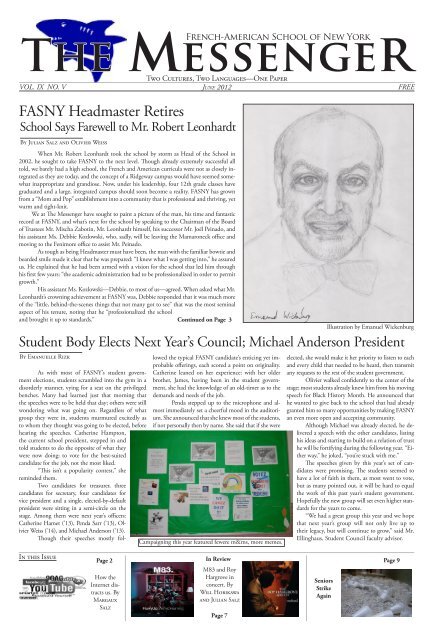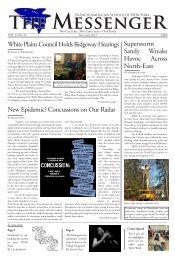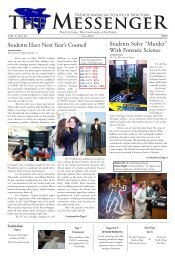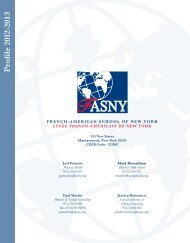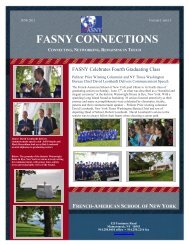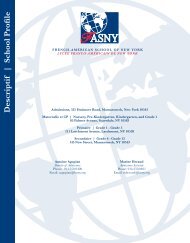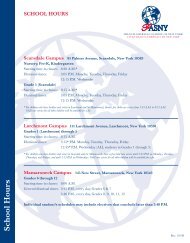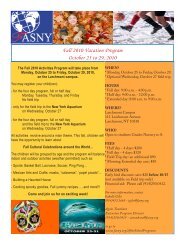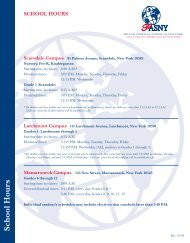FASNY Headmaster Retires - Franco-American School of New York
FASNY Headmaster Retires - Franco-American School of New York
FASNY Headmaster Retires - Franco-American School of New York
- No tags were found...
Create successful ePaper yourself
Turn your PDF publications into a flip-book with our unique Google optimized e-Paper software.
French-<strong>American</strong> <strong>School</strong> <strong>of</strong> <strong>New</strong> <strong>York</strong>The MessengerTwo Cultures, Two Languages––One PaperVOL. IX NO. V Ju n e 2012 FREE<strong>FASNY</strong> <strong>Headmaster</strong> <strong>Retires</strong><strong>School</strong> Says Farewell to Mr. Robert LeonhardtBy Julian Salz and Olivier WeissWhen Mr. Robert Leonhardt took the school by storm as Head <strong>of</strong> the <strong>School</strong> in2002, he sought to take <strong>FASNY</strong> to the next level. Though already extremely successful alltold, we barely had a high school, the French and <strong>American</strong> curricula were not as closely integratedas they are today, and the concept <strong>of</strong> a Ridgeway campus would have seemed somewhatinappropriate and grandiose. Now, under his leadership, four 12th grade classes havegraduated and a large, integrated campus should soon become a reality. <strong>FASNY</strong> has grownfrom a “Mom and Pop” establishment into a community that is pr<strong>of</strong>essional and thriving, yetwarm and tight-knit.We at The Messenger have sought to paint a picture <strong>of</strong> the man, his time and fantasticrecord at <strong>FASNY</strong>, and what’s next for the school by speaking to the Chairman <strong>of</strong> the Board<strong>of</strong> Trustees Mr. Mischa Zabotin, Mr. Leonhardt himself, his successor Mr. Joël Peinado, andhis assistant Ms. Debbie Kozlowski, who, sadly, will be leaving the Mamaroneck <strong>of</strong>fice andmoving to the Fenimore <strong>of</strong>fice to assist Mr. Peinado.As tough as being <strong>Headmaster</strong> must have been, the man with the familiar bowtie andbearded smile made it clear that he was prepared: “I knew what I was getting into,” he assuredus. He explained that he had been armed with a vision for the school that led him throughhis first few years: “the academic administration had to be pr<strong>of</strong>essionalized in order to permitgrowth.”His assistant Ms. Kozlowski—Debbie, to most <strong>of</strong> us—agreed. When asked what Mr.Leonhardt’s crowning achievement at <strong>FASNY</strong> was, Debbie responded that it was much more<strong>of</strong> the “little, behind-the-scenes things that not many got to see” that was the most seminalaspect <strong>of</strong> his tenure, noting that he “pr<strong>of</strong>essionalized the schooland brought it up to standards.”Continued on Page 3Student Body Elects Next Year’s Council; Michael Anderson PresidentBy Emanuelle RizkAs with most <strong>of</strong> <strong>FASNY</strong>’s student governmentelections, students scrambled into the gym in adisorderly manner, vying for a seat on the privilegedbenches. Many had learned just that morning thatthe speeches were to be held that day; others were stillwondering what was going on. Regardless <strong>of</strong> whatgroup they were in, students murmured excitedly asto whom they thought was going to be elected, beforehearing the speeches. Catherine Hampton,the current school president, stepped in andtold students to do the opposite <strong>of</strong> what theywere now doing: to vote for the best-suitedcandidate for the job, not the most liked.“This isn’t a popularity contest,” shereminded them.Two candidates for treasurer, threecandidates for secretary, four candidates forvice president and a single, elected-by-defaultpresident were sitting in a semi-circle on thestage. Among them were next year’s <strong>of</strong>ficers:Catherine Hamet (’13), Penda Sarr (’13), OlivierWeiss (’14), and Michael Anderson (’13).Though their speeches mostly followedthe typical <strong>FASNY</strong> candidate’s enticing yet improbable<strong>of</strong>ferings, each scored a point on originality.Catherine leaned on her experience: with her olderbrother, James, having been in the student government,she had the knowledge <strong>of</strong> an old-timer as to thedemands and needs <strong>of</strong> the job.Penda stepped up to the microphone and almostimmediately set a cheerful mood in the auditorium.She announced that she knew most <strong>of</strong> the students,if not personally then by name. She said that if she wereCampaigning this year featured fewere m&ms, more memes.Illustration by Emanuel Wickenburgelected, she would make it her priority to listen to eachand every child that needed to be heard, then transmitany requests to the rest <strong>of</strong> the student government.Olivier walked confidently to the center <strong>of</strong> thestage; most students already knew him from his movingspeech for Black History Month. He announced thathe wanted to give back to the school that had alreadygranted him so many opportunities by making <strong>FASNY</strong>an even more open and accepting community.Although Michael was already elected, he delivereda speech with the other candidates, listinghis ideas and starting to build on a relation <strong>of</strong> trusthe will be fortifying during the following year. “Eitherway,” he joked, “you’re stuck with me.”The speeches given by this year’s set <strong>of</strong> candidateswere promising. The students seemed tohave a lot <strong>of</strong> faith in them, as most went to vote,but as many pointed out, it will be hard to equalthe work <strong>of</strong> this past year’s student government.Hopefully the new group will set even higher standardsfor the years to come.“We had a great group this year and we hopethat next year’s group will not only live up totheir legacy, but will continue to grow,” said Mr.Ellinghaus, Student Council faculty advisor.In this IssuePage 2How theInternet distractsus. ByMargauxSalzIn Review Page 9M83 and RoyHargrove inconcert. ByWill Horikawaand Julian SalzPage 7SeniorsStrikeAgain
<strong>School</strong> Life 3Ju n e 2012Teamwork a Central Theme <strong>of</strong> Mr. Leonhardt’s TenureContinued From Front PageWhen asked what his biggest obstacles ortoughest decisions were, Mr. Leonhardt said that nodecision was impossible, but rather that there weremany important ones. Some <strong>of</strong> the most memorable,he said, were launching the Ridgeway project, takingon the lease for the Scarsdale campus, and openingthe 11th and 12th grades, which he said was especiallydifficult given time constraints, the need to convince10th grade students to stay at <strong>FASNY</strong>, and the process<strong>of</strong> gaining accreditation from the French government.When asked about his leadership style, everyonepointed to the same word: “teamwork.” Mr. Leonhardtput it humbly, describing himself as “too lazy tobe a micromanager; I’m more <strong>of</strong> a teamwork guy.” Mr.Peinado said that Mr. Leonhardt “believes in his people,delegates choices, and always works in committees.”He added that the atmosphere Mr. Leonhardtcreated was “non-hierarchical,” in which it was notabout power, but about everyone working together.Mr. Leohardt will certainly be missed. “He’salmost like a father figure to me,” said Debbie. “He’snot just a boss, he’s a friend and a role model.”She fondly recalled how, whentelling a story, Mr. Leonhardt always“takes on every accent that the peoplein the story have, because it could beBrooklyn, or German, or French, andyou’re so engaged in it because he’s sohilarious, and he remembers everythingword for word.”Mr. Zabotin described his relationshipwith Mr. Leonhardt as being“based on open and honest communication,on mutual availability and on trust.Those are also the hallmarks <strong>of</strong> a goodfriendship, which our relationship hasbecome.” And when asked to describeMr. Leonhardt in a few words, Mr. Peinadosaid: “articulate, funny, intelligent,team-builder, and visionary.”Asked about his vision for FAS-NY, Mr. Leonhardt’s said it “starts withthe new campus. We’d like to expand to“It’ll be different without his famousbowtie or, as Mr. Zabotinputs it, his uncanny ability toquote La Fontaine for any givensituation.”1200 students in the near future.”The tuition will have to stay at the same rate,the curriculum will expand to include more non-nativeFrench speakers, and a new academic track willbe created. Mr. Peinado added that the courses mightbe more diversified through means <strong>of</strong> having morethan just the French curriculum, which will, in turn,reinforce the international aspect <strong>of</strong> the school. Somestudents, in fact, might not even need to speak French.He qualified¬ this, though, by saying that the Frenchbaccalaureate still needs to be a focal point.On the transition from Mr. Leonhardt to Mr.Peinado, the former said he believes that there will bevery little to no change. Mr. Peinado said that he is“not looking to go in a different direction,” stating thatComputer Program to Undergo Fundamental ChangeBy Amelia Getahun-Hawkinsthe transition will have a “positive and serene” essenceto it and that he will make sure to keep the school “trueto its mission.”Mr. Zabotin, in a letter he wrote for the Gala,said that Mr. Leonhardt made sure that <strong>FASNY</strong> did“not let academic excellence come at the expense <strong>of</strong>well-rounded, respectful, and unassuming students,”and, in his interview, he said that Mr. Peinado complimentsthis view <strong>of</strong> the school with his “holistic approachto pedagogy,” concluding that he was the obviouschoice for the position <strong>of</strong> Head <strong>of</strong> the <strong>School</strong>.Mr. Leonhardt, for his part, doesn’t plan onretiring and sitting on Florida’s sunny beaches just yet;he is waiting for what the future may have in stock.Asked to reflect on his plans, what he’s learnedat <strong>FASNY</strong>, and what he will miss most, he said that,after his health scare in 2009, he feels not only muchhealthier, but also “much better,” and that his lyingin a hospital bed provided for a lot <strong>of</strong> perspectiveand insight for the graduation speech he delivered to<strong>FASNY</strong>’s trailblazing class <strong>of</strong> 2009. When it comes tolife lessons, he believes that he has “developed a deeperunderstanding <strong>of</strong> the importance <strong>of</strong> listeningcarefully; I have learned to be verypatient.” He says that he will certainlymiss, above all, “the people, and the opportunityto work in a bilingual environment.”It seems clear that Mr. Leonhardt’sleadership for the past ten yearshas not just changed an entire school forthe better, but also instilled in <strong>FASNY</strong>his own values <strong>of</strong> pr<strong>of</strong>essionalism withwarmth, trust with responsibility, andgrowth with stability. It’ll be differentwithout his famous bowtie or, as Mr.Zabotin puts it, his uncanny ability toquote La Fontaine for any given situation,but his legacy remains, and so doeshis sparkling personality. As he led theschool through its largest expansions, sohe leads a new chapter in his life, and wewish him the best.<strong>FASNY</strong> has <strong>of</strong>fered Computer class for thepast sixteen years but it’s time for a change. Whilethe school plans to use computers more than ever,<strong>FASNY</strong> has decided, essentially, to cut the class itselfin half.Computer classes will still be into groups <strong>of</strong>regular, intermediate and ESL, but they will onlytake place for one semester per year, except for in theninth grade, because those students need a full year<strong>of</strong> the class for their Brevet.Why only one semester? Like many independentschools that cut the class entirely, the administrationfeels that one semester is enough for<strong>FASNY</strong> students to absorb the basics <strong>of</strong> Computer.However, C-omputer classes are not being entirelystopped because students still need to acquire basiccomputer skills.To make up for the half <strong>of</strong> the program thatwe miss, computers will be integrated more in regularclasses and students will obtain computer skillsthrough them. For example, high school studentswill learn programming in math class.Many will be disappointed about the shortening<strong>of</strong> one <strong>of</strong> their favorite classes, but the timewill be used during the other semester for StudyHall and elective classes. Also, the administration istrying to put in place a pilot program for studentsusing laptops in class.The one sticking point might be one <strong>of</strong> thosemost fundamental skills: typing. Since formal computerclasses have been canceled at the lower school,the Larchmont and Mamaroneck administrationwant to make sure that students acquire good typingskills.It’s also a time to ask about First Class—will it be the program <strong>of</strong> the future? Mr. Peinadosays that the technology department is looking intochanging from First Class to a Google-based mail.Illustration by Zoé Guyot
4YES!By Olivier WeissOpinionJu n e 2012The Evolution <strong>of</strong> Video Games: Is It Art Now?NOT REALLY!By Emanuel WickenburgArt: what is it? That’s a pretty good philosophicalquestion, and, depending on what andwhom you study, you’re going to get a lot <strong>of</strong> differentanswers. For me, art is a representation <strong>of</strong> abstractconcepts through means <strong>of</strong> symbolism and creativity.Art is about the human mind and its varying,faceted interpretations <strong>of</strong> life and all <strong>of</strong> its succeedingevents. Art isn’t limited by tradition, and themeans by which it is conveyedare not subject to arbitrary restrictions.Art manifests itselfin book form just as it does indirt because it transcends thematerial through which it wasmade by appealing to the idealand the symbolic in us, by appealingto our reason.Today, art is taking onmany different forms. Booksare becoming less tangible andmore and more digital. Moviesare disappearing from the bigscreen and transferring overto the small and the mobile.The big things in music aren’talbums anymore; they’re actuallylive concerts.But here’s one more change that may not justbe recognizing reality, but a matter <strong>of</strong> opinion: videogames can now be art.Consider a couple <strong>of</strong> the video games thathave come out over the past few years. ConsiderGrand Theft Auto IV, which tells the tale <strong>of</strong> a thirtyyear old Eastern European immigrant, Niko Bellic,who comes to America in search <strong>of</strong> the <strong>American</strong>Dream. He arrives in Liberty City (NYC) to be greetedby a cousin who, many years prior, had done as hedid. Soon, however, Bellic finds that America’s streetsaren’t really paved with gold, that his cousin doesn’town the mansions he claimed he had, and that lifein Liberty City can be just as painful and violent aslife in his home country. As he attempts to restarthis life, he gets bogged down with organized crimeas the debt and the shadows that had haunted himin Eastern Europe come to bite him even when he’sa quarter <strong>of</strong> the way across the world, in the land <strong>of</strong>the free and the home <strong>of</strong> the brave. As the stoic maincharacter goes through the storyline, he meets moreand more people, each with their own problems,their own outlooks on life, and their own meanings.Although Grand Theft Auto IV may be crass, violent,and pornographic at times, this only adds on to artisticconception and vision <strong>of</strong> the lonely, biting, greedinessthat can be <strong>New</strong> <strong>York</strong> City. It’s a game that hasmore layers than possibly imaginable, a game that isdeep in meaning and rich in ideas, giving it a uniqueability to attract people from each end <strong>of</strong> the intellectualspectrum.Or how about Fallout: <strong>New</strong> Vegas, a gamecentered on civilization’s post-nuclear apocalypse?The world ended with a loud bang on October 23rd,2077, as China and the United States engage in TheGreat War, in which the two countries launch theirrespective atomic bombs at each other following aSecond Cold War. Your character is a courier workingfor the Mojave Express in the vast expanse <strong>of</strong> theMojave Desert in 2281, and the world is still heavilyscarred from the nuclear Armageddontwo centuries ago. There is apower struggle over the control <strong>of</strong>the Hoover Dam between a U.S.-based government called the <strong>New</strong>California Republic (NCR) andCaesar’s Legion, an authoritarian,slave-holding regime with a cult <strong>of</strong>personality centeredaroundCaesar, and RobertHouse, anenigmatic billionairegeniuswho protected Las Vegas fromnuclear destruction in 2077 and isstill alive, through his own genius,in 2281, forwarding his vision <strong>of</strong>a free <strong>New</strong> Vegas with an atmosphere<strong>of</strong> decadence withoutelitism. Your character is in themiddle <strong>of</strong> it all, and must decidewhether to help one <strong>of</strong> these threesides, or help himself control <strong>New</strong>Vegas.Through amazing dialogue,thousands <strong>of</strong> sub-quests that are indirectly linked tothe main storyline, and a Rat Pack-Sinatra-cool-‘50satmosphere, Fallout: <strong>New</strong> Vegas truly captivates, notjust because <strong>of</strong> its dark, caustic, dripping humor orviolence, but also because it confronts the player withdifferent philosophies <strong>of</strong> life, hard moral choices, andan overwhelming sense <strong>of</strong> building fun and achievementas the game goes on and on. In short, Fallout:<strong>New</strong> Vegas is art.Assassin’s Creed, Portal, the Halo series, the ElderScrolls series, Heavy Rain, Red Dead Redemption,the list <strong>of</strong> amazing, artistic video games goes on andon. Video games can aspire to great things.They can be insightful, pr<strong>of</strong>ound, and revelatoryjust as they can be insipid, stupid, and totaltrash. Just because Call <strong>of</strong> Duty is a waste <strong>of</strong> $60doesn’t mean that the Fallout series is as well, just likehow Twilight is a waste <strong>of</strong> paper, but CrimeIllustration by Louis Le Jamteland Punishment is worth being assigned bya school for summer reading.Whether you buy my argument or not, videogames are no longer limited to Pac-Man. As technologyimproves, so video games will become less andless restricted, and so they will become a part <strong>of</strong> themainstream, just as movies had a century ago. If youare an adult and you pride yourself in intellectualcuriosity and open-mindedness, please do yourself afavor and try one <strong>of</strong> the games I’ve listed. I promiseyou, you won’t regret it.Every single video game requires creativity,skill, intellect and painstaking hours <strong>of</strong>work to produce. What, then, differentiatesit from a painting, a novel, a poem, a song,or any other result <strong>of</strong> similar skill and effortthat is considered an ‘art’? Some would saythat nothing does, that Call <strong>of</strong> Duty is justas much an art form as the “Mona Lisa.”I believe there is a difference.I believe that art is defined not just bywhat is put into the making <strong>of</strong> it, but alsoby the emotional effect it has on people. Artshould convey something valuable to thebeholder; a sculpture or a painting may <strong>of</strong>fera different view, the artist’s unique way <strong>of</strong> looking atthings and finding aesthetic beauty in elements <strong>of</strong> reallife, a book or film can transmit the author’s or the filmmaker’sideas, and a song can inspire, can provoke emotion.Video games may have potential to do this, butthey haven’t sufficiently explored that possibility yet. Avideo game doesn’t teach anything, doesn’t enlighten, anddoesn’t give a fresh perspective on life, because while playing,the gamer is in charge and simply “acts” as in real life.The video game <strong>of</strong>fers an imitation <strong>of</strong> everyday life.Not only do video games fail to expand people’sminds in the way art should, they also have a negativeimpact on people’s lives. Art is supposed to help peoplein some way, and if something has the opposite effect itshouldn’t qualify as art.After all, who would want to succeed in real lifewhen there is a much simpler virtual world where youdon’t have to worry about consequences for actions andyour only objective is not to get killed? Real life seemscomplicated and overwhelming in comparison, and allyour energy is transferred to succeeding in an electronicallygenerated, escapist world. This is not my conception<strong>of</strong> a work <strong>of</strong> art.Finally, video games may have a negative effecton public health. Scientists continue to investigate thecorrelation between exploding child obesity rates in theUS and the growth <strong>of</strong> the video game industry amongmany factors. It is logical that many kids and teens wouldnot want to run around outdoors and sweat when theycould spend the day comfortably glued to their s<strong>of</strong>a, maneuveringa virtual world and exerting only the musclesin their thumbs. The obesity epidemic and lack <strong>of</strong> exercisedrastically shorten life span and reduce quality <strong>of</strong> life.Taken a bit further they have been projected to cause atremendous tax burden on the country due to the extramedical support needed.For these reasons, video games are an industry,rather than an art, which is supposed to benefit Mankind.That being said, video games may have the potentialto become an art if executed differently; and, afterall, maybe it’s the fact that they are not an art form thatmakes them so fun.
Opinion 5Ju n e 2012IntercoursA Column That Strives Not ToInclude Mature SubjectsThe Goodand the BadBy Michael Anderson andArmand LatreilleIntercours is back froma one-issue hiatus! If you hadn’tnoticed that gaping awkwardhole in the last Messenger issue,it’s because our last columnwas deemed a little too controversialby higher powers. Asa result, we’ve come up withsomething not controversial atall: our unbiased opinions onrandom things! Actually, we’veworked hard on this installment,to make up for the lastone. We took some precioustime away from Bac revisionsand finals studying to collectour thoughts for a moment,and reflect on the year thatwas. Without further ado, thisis Intercours’s season finale.LinsanityES WorkloadGiants Super BowlJiminy PeakEnd <strong>of</strong> tyrant regimesJustice @ terminal 5The rentrée that wasn’t (flood)End <strong>of</strong> the world in 7000 yearsKONY 2012 YEAAAAH(just kidding, why is nobodypaying attention to Syria?)NBA on ChristmasSenior PrankEnd <strong>of</strong> the war in Iraq7th Billion baby bornSpirit Week SpiritHalloween ParadeRugby InjuriesShark MascotSpace Shuttles retiredDie down <strong>of</strong> Occupy movementsDeath <strong>of</strong> Steve JobsS WorkloadPakistan FloodingKnicks First Round ExitGreek CrisisThe Entire Month <strong>of</strong> February:SAT, TPE, and Bac Blanc<strong>School</strong> on SaturdayRock Bottom Meh AwesomeBy Armand LatreilleExactly a year ago, thisnewspaper published anarticle explaining why NicolasSarkozy would liveto serve another term asthe President <strong>of</strong> France.I thought it was a brilliantarticle that perfectlyIllustration by Louis Le Jamteloutlined Sarkozy’s assetsin contrasts to <strong>Franco</strong>isHollande’s weaknesses. Needless to say, my predictionturned out wrong, and Hollande replaced Sarkozy as theincumbent <strong>of</strong> the Elysee Palace a month ago. Why did itcome to this?Sarkozy’s presidency started with a misstep thatwould symbolize his governing style: instead <strong>of</strong> celebratinghis victory with the thousands that were waitingin la Place de la Concorde, him and 60 select few barricadedthemselves at Fouquet’s, one <strong>of</strong> the more “upscale”restaurants in Paris. Attendees included Frenchbillionaires, finance moguls, CEOs <strong>of</strong> important Frenchcorporations, and Johnny Hallyday. In other words, theentire who’s who <strong>of</strong> powerful French personalities waspresent. Needless to say, nobody in France except the 60people invited thought this was the best way to start <strong>of</strong>fa presidency. Imagine if Obama had suddenly decidedto ditch his election party at Grant Park and insteadhead to a posh <strong>New</strong> <strong>York</strong> City restaurant to eat lobsterwith Trump, CEOs <strong>of</strong> Goldman Sachs and JP Morgan,Rupert Murdoch, and Bruce Springteen.During his campaign, Mr Hollande frequentlytalked about the dignity <strong>of</strong> the French presidency, radicallymore so than in previous campaigns. Indeed, hesaw the important hatred; disgust, and distrust Franceas a whole felt for Sarkozy, and wisely ran a campaignwhose semi-<strong>of</strong>ficial main slogan was “5 years <strong>of</strong> Sarkozyis enough”. Mr Sarkozy was never a president <strong>of</strong> thepeople, rather, he was viewed as a “bling, bling” personality,meaning attracted to all that shines and makesnoises. It was easy to point out his dérapages, becausethey were frequent and gave fodder to tabloids. Sarkozywasn’t educated through the traditional grandes écoles,the very prestigious and elitist French universities, unlike<strong>Franco</strong>is Hollande. He liked to say what was onhis mind, and he was anything but s<strong>of</strong>t-spoken. Furthermore,he championed wildly unpopular austerityreforms that gave the impression he was disconnectedfrom the hardships <strong>of</strong> the French. That, and his verypublicized and self-proclaimed 140% pay raise didn’thelp. Despite being a powerful speaker, his public behaviorwas detestable to many voters, whom saw in hima mean, arrogant, and incapable little man. Simply put,he was an anthipathetic president.French voters historically favor “close to thepeople” presidents. They need a president that they canrelate to, and in many elections, the electorate favoredthe president whom they could picture themselves sitdown and have a beer with. Sarkozy was literally the antithesis<strong>of</strong> the model president. Never in five years didFrance feel represented in him, and he never really actedto change that. He was vulgar and his early mistakes (likethe Fouquet’s dinner) had a lasting impression. What’smore, voters recognized his efforts towards fixing theeconomy, and other overall policies: polls suggest thatSarkozy has a better record (against Hollande) in having“the authority <strong>of</strong> a head <strong>of</strong> state” and for being “capable<strong>of</strong> taking the right decisions faced with the current economicand financial crisis.”France’s Changing Political SceneHollande entered the presidential race as a pr<strong>of</strong>oundoutsider. Indeed, many speculate that, had DominiqueStrauss-Kahn not been implicated in the murkyrape scandal in <strong>New</strong> <strong>York</strong> last summer, he would havenever secured the nomination. Hollande was rocked byultra-left challenger Mélanchon, and was an easy targetfor criticism: he had, after all, never held an importantgovernment position; and his policies in home departmentCorreze left the budget riddled with debts. However,he was s<strong>of</strong>t-spoken, humble, calm, and appealingto voters who simply wanted to get rid <strong>of</strong> Sarkozy.In trying times, the French needed to be re-assured,and Mr. Hollande did just that. While recognizingthe width <strong>of</strong> the financial crisis, Hollande made achoice in opting to criticize the difficult steps Sarkozyhad taken to end the crisis (pension age at 60, diminishing<strong>of</strong> public sector employees); and comfort the electoratewith popular policies (attack on the richest, augmentation<strong>of</strong> teachers by 60, 000 posts). His proposal <strong>of</strong>a 75% tax on millionaires is an example <strong>of</strong> a gratuitouspromise, aimed at striking voter’s heart- not their brains.It’s easy to blame the banks, the rich, and the marketsfor the financial hardships France has to face. It’s harderto advocate unpopular reforms (read: austerity) neededto steer clear <strong>of</strong> trouble.Instead <strong>of</strong> pushing for a balanced budget, ora roll-back <strong>of</strong> state spending, both Sarkozy and Hollandestuck to calmer seas; promised to expand the role<strong>of</strong> the state and supervision <strong>of</strong> markets. Now, both <strong>of</strong>them are smart men, which have many other intelligentaides. They know that this is not the recipe forbetter economic times.However, it seemed like any method was acceptablefor gaining voters. Sarkozy, for example, toughenedup his stance and advocated a borderline xenophobicagenda concerning immigration to woo extreme-rightvotes. As a result, no one was quite sure what wouldeach candidate do once in <strong>of</strong>fice. For example, not manyvoters actually thought that Hollande’s tax proposal wascredible. Many critics, however, observed that Sarkozyhad the personality and potential to pass the hard reforms;while Hollande would likely be more influencedby the electorate. And, the vote reflected that belief.France was scared <strong>of</strong> Sarkozy, and it became Hollande’selection to loose. After Sarkozy failed to muster his eloquenceduring the single debate, it was clear that he hadlost the vote.Was the election a total rebuttal <strong>of</strong> Sarkozy’spolicies? Not really.While some <strong>of</strong> his reforms were unpopular,many saw the good in them. Furthermore, he wasn’t asradical as some people had hoped he would be, but thetendency showed promise. He fostered an important relationshipwith foreign leaders, particularly Germany’sAngela Merkel and USA’s Barack Obama. He did putFrance back on the map, and strengthened its relationshipwith its allies. On the home front, he wasn’t afraidto advocate a tough—but somewhat popular—stanceon immigration and racial problems (see the ban onveils), and he set the country on the right path towardseconomic recovery.If anything, this election is the pro<strong>of</strong> that personalitydoes have an impact on the voters. France showedup en masse against Sarkozy the man, not the president.And, as I re-read last year’s article, I realize that I, too,vouched for Sarkozy- the president, not the man. I waswrong.
6WorldJu n e 2012The Beast Lies WithinBy Maddie King“The Afternoon wore on, hazyand dreadfu(…; the sow staggered her wayahead <strong>of</strong> them, bleeding and mad, and thehunters followed, wedded to her in lust,excited by the long chase and the droppedblood.…. They were just behind her whenshe staggered into an open space where …butterflies danced round each other and theair was… still. Here, struck down by theheat, the sow fell and the hunters hurledthemselves at her.…Then Jack found thethroat and the hot blood sprouted over hishands. The sow collapsed under them. Atlast the immediacy <strong>of</strong> the kill subsided. Theboys drew back, and Jack stood, holdingout his hands.“Look”He giggled and flicked them whilethe boys laughed at his reeking palms.(…)Roger began to withdraw his spear (…).Robert stabilized the thing in a phrase thatwas received uproariously.“Right up her ass!”(…)This time Robert and Mauriceacted the two parts; and Maurice’s acting<strong>of</strong> the pig’s efforts to avoid the advancingspear was so funny that the boys cried withlaughter.(…) The butterflies still danced,preoccupied in the center <strong>of</strong> the clearing.”--Lord <strong>of</strong> the FliesFor a bunch <strong>of</strong> twelve-year-old kids, thebehavior shown in this passage fromLord <strong>of</strong> the Flies is not only unexpected,but frighteningly eerie. Set duringWorld War II, the book recounts thestrange evolution <strong>of</strong> a group <strong>of</strong> youngBritish boys after their plane crashesonto an uncharted island. While, in thebeginning, the boys, aged 6-12, continueto act with a “civilized” conscienceand sense <strong>of</strong> responsibility, they soonembrace a life <strong>of</strong> savagery.This conduct can be viewed intwo different ways: either as a mentalregression into a more primitive state,or the emergence <strong>of</strong> evil from the verydepth <strong>of</strong> the human nature.It could even be a correlation<strong>of</strong> both. The author’sautobiography suggests thatviolent tendencies as a teenagerwas one <strong>of</strong> the greatestelements that inspired himto write the book. The timeperiod is no coincidence either.In his memoir, WilliamGolding, the author,admits: “World War II wasthe turning point for me.I began to see what peoplewere capable <strong>of</strong> doing. Anyonewho moved throughthose years without understandingthat man producesevil as a bee produces honey must havebeen blind or wrong in the head.” Somesuggest that the book is actually an allegory<strong>of</strong> the war: the boys start out asfriends, brothers, even, yet are dividedonce some are unwilling to submit tothose who are by that time insane withpower and barbarism.Many psychological tests weremade in the second half <strong>of</strong> the centuryconcerning this type <strong>of</strong> radical behaviorchange. In 1971, Philip Zimbardoconducted his famous Stanford prisonexperiment. The procedure’s goal wasto study the psychological reaction <strong>of</strong>seventy-five perfectly normal men whengiven the role <strong>of</strong> either a prison guard ora prisoner.The results were shocking. Afteronly two days, the prison guards startedto psychologically and physically abusethe prisoners. Various forms <strong>of</strong> humiliationwere handed out as punishment forbad behavior while the obedient wererewarded with better cells, meals andsupplies. Six days in, the experimentshut down. The men’s reactions wereeven more extreme than Zimbardo hadpredicted: many <strong>of</strong> the guards seemed tohave developed true sadistic tendencies,and the prisoners were, <strong>of</strong> course, traumatized,and grew to internalize theirprisoner role as a result. One prisonereven had to be removed from the mockprison after 36 hours on account <strong>of</strong> violentcrying, bouts <strong>of</strong> anger and screaming.In the end, Zimbardo concludedthat the participants’ behaviors weremore due to the intense situation ratherthan their individual personalities. Heeven wrote a book entitled The LuciferEffect, which questions whether we canever be sure we are inherently good.Numerous critics challengedZimabardo’s verdict. Erich Fromm, notably,defended a different theory: thatviolent behavior such as this is unalterablydue to character traits. He arguedthat the experiment carried out by Zimbardowas incorrectly and unjustly executed,and even referenced the Naziconcentration camps to support hisviews.Also, in a more recent context,soldiers in enemy territory have beenknown to have had similar irrationallyviolent behaviors. Abhorrent pictures<strong>of</strong> the military posing in insulting positionswith Iraqi prisoners and corpseshave frequently been turning up in themedia. We have viewed these pictureswww.nobelprize.orgwith disgust and horror, and, uncomprehending,we have either assumedthat these people were the “bad apples”<strong>of</strong> the bunch or attributed their actionsto pure traumatic insanity.But can it be more than that?The truth is, a hostile environmentbrings out the worst in us. With a licenseto kill (or in the case <strong>of</strong> Lord <strong>of</strong> the Flies,a license to survive), people are capable<strong>of</strong> things they would not have fathomeddoing when they had ethically and sociallyimposed boundaries. In studyingLord <strong>of</strong> the Flies, we observe that theboys begin to lose it not when they startmurdering each other, but way beforethat: when they slaughter their first pig.Could this be the root <strong>of</strong> ourproblem? If, in your mind, you are ableto kill, then you are able to harm. If youare able to harm, you are able to torture.And once you are able to torture, thenthere is very little separating you fromutter sadism. Now say you were in aposition in which you were personallyhanded a gun and told you had to killthe people in front <strong>of</strong> you if you andyour people wanted to survive. Whatwould happen then? Would you releasethe beast within?The French-<strong>American</strong> <strong>School</strong> Of <strong>New</strong> <strong>York</strong>MessengerGood luck to Debbie in her new post in the Fenimore <strong>of</strong>fice! We will miss you! Visit us <strong>of</strong>ten!Editors-in-Chief: Emanuelle Rizk, Julian SalzManaging Editors: Armand Latreille, Olivier WeissVOL. IX NO. VMiddle <strong>School</strong> Editor: Margaux Salz Sports Editor: Paul Castaybert Design Editor: Clémence Wassen Copy Editor: Emma GuyotDrawings by Louis LeJamtel and Emanuel Wickenburg.Reporting Staff: Michael Anderson, Victor Counillon, Joaquin Delmar, Jurnivah Désir, Thomas De Villemejane,Amelia Getahun-Hawkins, Nicolas Granato, David Guyot, Zoé Guyot, Guillaume Horikawa, Emilie Kehm,Maddie King, Cedric Nakashima, Sophia Nee, Yuri Nessen, Elizabeth O’csay, Mathieu Rizk,Oumou Sarr, Jacqueline Sarro, Emanuel Wickenburg, Camile Williams, Irène Woo.Ecole <strong>Franco</strong>-Américaine de <strong>New</strong> <strong>York</strong>French-<strong>American</strong> <strong>School</strong> <strong>of</strong> <strong>New</strong> <strong>York</strong>Faculty Advisors: Mrs. Anne K. Culhane, Mr. Tom FaureSpecial thanks to Ms. Creteur, Mr. Guyot, Ms. Lopez, and Mr. Taylor145 <strong>New</strong> Street, Mamaroneck, NY 10543(914) 250-0000 www.fasny.org
In ReviewJu n e 20127Jazz: Roy Hargrove at the Village VanguardBy Julian SalzDespite what theuninformed or uninitiated earmay hear, there is no musicquite as brilliant or original in itssound as Jazz, the music whichwas the anthem <strong>of</strong> a youngand unfailingly optimisticgeneration. Sadly, the fascinationfor this sound waned with therapid and dramatic evolution<strong>of</strong> the country which hadnursed it. And for more than30 years, what was and is stilltoday one <strong>of</strong> the centerpieces <strong>of</strong><strong>American</strong>a seemed abandonedto an art form appreciableonly to the “intellectual” andnostalgic. Thankfully however,America has not completelyforgotten the tones and rhythmsunimaginable by anyone else,and neither has Roy Hargrove.Th e 42 year-oldHargrove returned to theVillage Vanguard in the WestVillage this past April to showthe once “Mecca <strong>of</strong> Jazz” thatthe music and its audience wasstill breathing ferociously. ButHargrove is not merely one <strong>of</strong>the young lions who emergedinto the contemporary jazzscenes in the early 1990s.He is also at the forefront <strong>of</strong>a neo R&B/soul group, theRH Factor, with which hewon a Grammy in 2002. Healso acted as a sideman forrapper Common and nowfronts the Roy Hargrove BigBand. As has now becomesomewhat <strong>of</strong> a tradition, hisquintet returned to one <strong>of</strong> thepremiere but discreet venues onManhattan’s lower west side toperform pieces from its mostrecent albums, “Earfood” and“Nothing Serious”.A Jazz show is unlikeany other form <strong>of</strong> live music,blending a mood, acoustic, andpersonality all its own whichdoes not exist in any other style.The Village Vanguard, whichhas played host to some <strong>of</strong> thebest artists and live recordingsin Jazz, is the perfect initiationto this music. The playersare only a few feet from you,displaying their groans andcries <strong>of</strong> approbation. Jazzmenare playing nearly every night,laboring to create somethingcompletely original. Thephysical, mental and spiritualdemands <strong>of</strong> this art form canbe seen on the grimaces, smiles,and shouts <strong>of</strong> the players. Jazzgroups also share a communalintimacy, a will to play together,to maintain their own musicalpersonality and agenda whileworking as an ensemble. Thisis why Jazzmen are consideredto be the best musicians inthe world, because their genrerequires total commitment tocommunal creation. They arejust as talented at listening toeach other as they are at playingwith each other.This is what RoyHargrove did masterfully,playing six songs that trulyshowed the crowd theexceptionality <strong>of</strong> his talentand innovation. His last twoalbums, mentioned earlier, arefusions <strong>of</strong> post and hard bopwith simple but incredibly richand soulful melodic ideas. Thelength and brilliant simplisticoriginality <strong>of</strong> his phrasingduring ballads is reminiscent <strong>of</strong>Miles Davis, yet he also delightsin exposing the influence DizzyGillespie had on him in hisbop and Afro-Cuban inspiredpieces. His now longtime altosaxophonist Justin Robinsonpours just as much excitementas talent into his breathtakinglylong and complex solos, leapfroggingbetween pitches at analmost frightening but thrillingrate <strong>of</strong> speed. Pianist SullivanFortner showed why he is one<strong>of</strong> the most creative players <strong>of</strong>his time with R&B and funkinspired riffs evocative <strong>of</strong> catchyhip hop instrumentals. QuincyPhillips created what can onlybe described as a shining sea <strong>of</strong>perpetually crashing symbolsand fills, dabbling even in discoand rap beats that blendedsurprisingly well with AmeenSaleem’s cool bass.Hargrove’s quintet’sunique sound is driven by itscareful blend <strong>of</strong> the best <strong>of</strong> thenand now. Each musician playswith one ear leant to the pastand one towrds the future <strong>of</strong> Jazzwhich is just as unpredictable asit was in its heyday.Even if your ear is notone to be taken on an incrediblejourney by the solos <strong>of</strong> Coltraneor the tone <strong>of</strong> Miles Davis, youtruly have not fully experiencedlive music until you’ve seen ajazz show. Jazz doesn’t have tobe reserved for the intellectual,nostalgic or old, but right nowit seems to be doing just fine onits own.Dreaming in Outer Space with M83By Will HorikawaFollowing the release <strong>of</strong> acritically-acclaimed album HurryUp, We're Dreaming and MidnightCity, arguably the track <strong>of</strong> the year,M83 has been spending the majority<strong>of</strong> 2012 on a worldwide tour, andstopped by <strong>New</strong> <strong>York</strong>'s Terminal 5this May to play one <strong>of</strong> the venue'smost dazzling, energetic and electrifyingshows <strong>of</strong> the year. The Frenchoutfit took the stage right after a veryM83 performing at Terminal 5strange looking alien creature, noneother than the one feature on theMidnight City single artwork, whowarmed up the crowd while a cinematic,orchestral composition followedhis every move. Suddenly, thelights fade to black, and M83 begintheir set with the aptly named "Intro",a heart-wrenching synth trackwhich invigorates the crowd withlead singers Anthony Gonzalez &Morgan Kibby's escalatingvocals. The mesmerizingis also in full effectfor the very first time:the stage was filled withneon light cylinders andthe walls were coveredin a bed <strong>of</strong> scintillatingstars (This is almost tobe expected when yourband is named after agalaxy, Messier 83). Theband worked throughan eclectic set list, incorporatingsongs frommany different albums,and because <strong>of</strong> this,they were able to createa concert experiencethat is second to none:in less than 90 minutes,I felt as if I had been toa sold-out stadium rockperformance (Reunion,This Bright Flash), a 90'srave (Sitting, Couleurs),a local indie show (YearOne, Year UFO), an 80sparty (Steve McQueen,Graveyard Girl) an orchestralrecital, the listgoes on & on.But if there was onething to remember from M83that night, it would simply be thefact that, more than the vast majority<strong>of</strong> independent bands today, theyunderstand and value the context <strong>of</strong>a live show and put in effect so manynoteworthy adjustments to make theaudience's experience a memorableAlbum cover for M83’s Hurry Up, We’re dreamingone: be it mixing down new layers <strong>of</strong>sounds over already familiar songs,processing mind bending electronicsthrough synth modules betweentracks or simply jamming out oncowbells, the band always looksready to perform like there's no tomorrow.
Senior Prank 9Ju n e 2012All photos by Emanuelle Rizk
Science 11Ju n e 2012Manger ou conduire, il faut choisir!Par Aurore Jousset-DrouhinEcrit pour la classe de Mme LopezNous connaissons tousle terme « Boire ou conduire,il faut choisir ! » Il nous vientà présent une nouvelle expression,en rapport cette fois-ciavec le nouveau dilemme international,les biocarburants.« Manger ou conduire, il fautchoisir ! » Mais pourquoi ?Les biocarburants sont, depuisquelque temps, une solutionplausible contre la pollution.Malheureusement, il seraitbien trop facile de pouvoirs’en arrêter la. Les biocarburantsconnaissent certainsinconvénients par rapport àl’environnement mais aussipar rapport à l’Homme. Maisquels sont ces facteurs quifont de l’agro carburant unsujet si controversé?Il existetrois générationsdebiocarburants: la premièrese base principalementsurdes plantesoléagineuses,comme, parexemple, letournesol, donton extrait leshuiles qui sontensuite misesen transestérificationpourpouvoir donnerune huilevégétale quisera mélangéeau gazole. Siles plantes oléagineuses sontintrouvables dans la région,on peut alors se relier à lafabrication d’éthanol grâceà la fermentation des sucres(betterave/canne à sucre) oud’amidon (blé/maïs/pommede terre) dans lequel on rajoutede l’isobutylène pourenfin pouvoir le mélangerà de l’essence. Cette premièregénération présentedéjà de sérieux problèmesqui affectent non seulementl’environnement, mais aussil’alimentation de l’humanité.Pour pouvoir vous donner unaperçu du problème, prenonscomme exemple la culture demaïs au Mexique. Sa culturereprésente plus de 60%, voireplus, du budget de base deplusieurs Mexicains. En 2007,on assiste à une hausse brutaledes prix, chose qui amènera àla crise de la « tortilla ».Les Etats Unis rachètentune grande partie decette récolte pour pouvoirproduire de l’éthanol, doncdes biocarburants. Il ne restedonc rien pour la populationdu Mexique. Selon LesterBrown, il faut 2,5 quintaux demaïs pour faire le plein d’un4x4. Aveccette mêmeq u a n t i t é ,on pourraitnourrirune famillemexicainependant unan. Un simpleexemplesuffit : legraphiquec i - c o n t r ereprésentel’évolutionde la surfacedesterres agricolespar habitant.En 2000, lasurface disponiblecultivée parhabitant estde 0.25 enhectares. Unrésultat déjàm é d i o c r esachant quela populationest deplus de 6m i l l i a r d s .D’après lesstatistiques,en 2050,la populationauraaugmentéede plus de3 milliards. La surface cultivéesera de 0.14 hectares.Pour pouvoir nourrir lapopulation, il faudrait alorsque la production alimentaireaugmente de plus de 70%. Sil’on continue à suivre la premièregénération, cet exploitsera-t-il possible ?C’est alors que la deuxièmegénération rentre en jeu.Pour pouvoir limiter les impactssur l’Homme ainsi quel’environnement, la recherchetravaille sur un autre développement.Ce deuxième essaiutilise comme matière desvégétaux non alimentaires,c’est-à-dire des résidus de boisainsi que des déchets agricolescomme la paille. Les élémentsseraient alors soumis à unegazéification suivie d’une synthèse,ce qui donnera alorsde l’hydrocarbure qui seraensuite mélangé à l’essence.Même chose pour les cultureset les taillis, qui seronteux, soumis à une fermentation.Cette technique reste unavantage au niveau de la surfacecultivable, mais présentede nombreux problèmes,notamment face à la déforestation.L’Indonésie est un paysoù la culture des palmeraies sefait en grande quantité, pourpouvoir produire des huilesd’agrocarburant. Elle abriteaussi une des dernières populationsd’orangs-outangs. Pourpouvoir produire cette huile,il est nécessaire de déraciner,donc de détruire ces arbres.Les primates se retrouventalors sans habitat qui leurest propre, et sont donc plusvulnérables au monde qui lesentoure. On ne peut donc pasappeler cette méthode uneméthode viable à long terme.La troisième générationest encore au stade de larecherche en laboratoire. Maison sait déjà qu’elle serait faiteà base d’algues, et serait plusque prometteuse à long terme.La méthode serait la suivante: on synthétiserait des lipidestrouvés dans les micro alguesgrâce à du dioxydede carbone.La raisonpour laquellecette générationpourrait êtrela bonne est sarapidité. En effet,les algues sedévelopperaientplus vite quecertaines plantes,ce qui rendraitles hectaresutilisé beaucoupmoins importantsen nombre.Il est, pourl’instant, impossible d’en direplus sur cette technique carelle n’a pas encore été testée.Mais, on peut quand mêmese demander si ces alguesn’auront pas un effet secondairesur la population quis’en nourrit. Le fait que cetteplante se développe rapidementpermet d’en prendreune plus grande quantité, unequantité qui, malgré ca, pourraitdevenir trop importante.Les résultats restent à voir.Les biocarburants restentun sujet discuté de touscôtés. Cette nouvelle visionde l’écologie pourrait devenirtrès utile, ou alors très problématique.Pour l’instant lestrois générations présentéesont pu montrer de l’espoir,mais cachant un effet secondairefatal sur la nourriture,ainsi que l’environnement.Manger ou conduire, il fautchoisir !
12GamesHugo Cabret: un chef-d’œuvrePar Irène Woo“If you lose your purpose ... it’s like you’re broken.”—Hugo CabretTendresse, légèreté, humour, tristesse,anxiété et réjouissance, tous sont présents dansle chef-d’œuvre intemporel qu’est Hugo Cabret.Le film nous émeut au plus pr<strong>of</strong>ond de nousmêmes,en suivant les pas d’un jeune orphelinnommé Hugo Cabret, dans la gare du Parisdes années 30. Puis, à travers la vie de GeorgeMéliès, un contemporain du jeune héros, lamagie du cinéma nous est dévoilée et nos yeuxs’émerveillent comme ceux d’un enfant. HugoCabret, en bouleversant ainsi nos sens, s’affirmeaux rangs des Grands Classiques.Le film nous plonge dans un autreunivers, celui de Paris dix ans après la GrandeGuerre. Hugo vit avec son père, veuf, dansune horlogerie. Un jour, celui-ci rapporte d’unmusée un vieil automate particulièrementcomplexe. Ils tentent ensemble de le réparermais un incendie rendra le jeune Hugo orphelin.Il se défie alors de réparer le seul héritagede son père.L’automate devient donc la pièce centraledu puzzle qu’est Hugo Cabret.Survient alors l’antagoniste, le chef degare l’Inspecteur Gustave. Accompagné de sonchien féroce, il surveille la gare en quête d’unorphelin qu’il pourrait envoyer dans une sombreprison nommée orphelinat. Ses méthodesimmorales et brutales contrastent avec son histoireamoureuse. En effet, il tente de séduire lajeune fleuriste, qui tout d’abord le repousse àcause de sa fausse jambe. Cette caractéristiquedu film touche tous les autres personnages. Eneffet, le réalisateur nous livre une réelle étudepsychologique de tous ces personnages, en étudianttous leurs aspects, brutaux ou naïfs dansle cas de l’Inspecteur.Enfin vers le milieu du film, l’histoire deGeorges Méliès se place au premier plan. Petitset grands se verront émerveillés par ce conte del’histoire du cinéma, réalisé avec douceur et tendresseenfantine. Nous suivons donc les pas dece grand cinéaste avant et après la Guerre, dansson palais de verre puis dans sa petite échoppedans la gare. Les costumes et les caméras del’époque défilent devant nos yeux pour éveilleren nous quelques mémoires passées.Que dire alors ? Hugo Cabret est unchef-d’œuvre, signé par le grand réalisateur MartinScorsese. Tout nous enchante, tant la musiqueque les thèmes abordés. Toutefois, le filmdébute sur une approche très « photographique». Le silence prône alors que des scènes magnifiquesdéfilent. Ces scènes intéresseront surtoutles cinéphiles, avec douceur et volupté,mais peuvent paraître longues. Cependant, cepetit bémol ne ternit pas l’image intemporelled’Hugo Cabret.“I like to imagine that the world is onebig machine. You know, machines never have anyextra parts. They have the exact number and types<strong>of</strong> parts they need. So I figure if the entire world isa big machine, I have to be here for some reason,too.” —Hugo Cabret.Note: 4,5/5Ju n e 2012The Perfect LockerBy Amelia Getahun-HawkinsOption: S ou ES?By Margaux SalzTwo <strong>FASNY</strong> Students Make Kangourou FinalsCongratulations to Axel Ehlinger (’14) and Cyril Douady (’17) on their outstanding performance in theConcours Kangourou, the national French mathematics competition!Axel placed 10th out <strong>of</strong> over 11,000 contestants with his score <strong>of</strong> 102.5, while Cyril placed 5th out <strong>of</strong> over53,000 with a perfect score <strong>of</strong> 120.It doesn’t take a differential equation or exponential function to graph the level <strong>of</strong> their success. Their mathskills belong on a higher order. To say the two students have made <strong>FASNY</strong> proud would be no hyperbole—orparabola, for that matter.The two flew to Paris June 1st with math teacher Mr. Guyot to take part in a final competition at LycéeLouis le Grand. Though neither student took first prize at the final tournmaent, this did not detract—or should wesay, subtract—from their trip. The apex <strong>of</strong> the journey: they also got to see friends and family in France!Whenever a 9th graderis asked about their future, it’salways the infamous: “Whatsection are you going into?”which marks the beginning <strong>of</strong>endless hours <strong>of</strong> debate. Go toS and spend endless hours immersedin science, or choose ESand analyze every world economypossible? Although the answerto these harrowing questionsneed only be deliveredtowards the end <strong>of</strong> 10th grade,there are some choices thatneed to be made much sooner.At the end <strong>of</strong> 9th grade,students are given the choicebetween more options thanever before, such as two extrahours <strong>of</strong> art, literature, publicspeaking, or even additionalmath, physics and chemistry.Although these carry moreweight in academic careersthan previous decisions aboutchorale and music, they stillcan’t match up to the loomingchoice between S and ES.Decisions for 10thgrade are a baby step comparedto this choice, but they alreadyreflect the future determination<strong>of</strong> taking S or ES. Thosewho are ready to devote themselvesto S and all its scientificwonder will rush to additionalmath and physics classes, butthose who are already planningto go down the path <strong>of</strong>ES will probably choose differentoptions, such as PublicSpeaking, or even Literature.The good thing aboutsuch a small step is the factthat scientific options act likea small taste <strong>of</strong> S, minus thecrushing workload and buckets<strong>of</strong> stress. For those still onthe fence about their choice <strong>of</strong>section, it’s a better alternativethan signing up for S, goingthrough a few weeks <strong>of</strong> hell, andthen backtracking over to ES.It’s also certainly betterthan finding yourself in ESwhen all you dream about isspending hours staring at a physicsmanual, and being unable t<strong>of</strong>ulfill that wonderful ambition.In addition to givingfuture 10th graders more opportunitiesthan the traditionalchoice between chorale and music,and art, Latin, and <strong>American</strong>Math, 9th grade optionsgive students with a burningpassion for numbers and atomsa chance to delve deeper into thesubject without spending twentyhours a week on the subject.Others get the chanceto engage in more developedart classes and explore the possibility<strong>of</strong> a future career in art.Public Speaking, somethingthat no student has seen so farin their education, is a refreshingchange and the opportunityto try something new (anddiscover you’re a master at manipulatingpeople and shouldpursue a career in politics).10th grade optionsare a small stepping stonethat prepares students for thechoices they will have to takewhen choosing between S andES. The fact that they are sosmall is just an advantage overthe seemingly overwhelmingdecision <strong>of</strong> picking a sectionand making the first academiccareer-changing choice.All photos by Mr. Guyot
Games 13June 2012Cat and Mouse MazeSee if you can find your way out!Tic-Tac-ToeSudokuDifficulty: HardSusan LotheSummer Word SearchDots - Make more squaresthan your opponent!Crosssword Puzzle2-3. What bargain hunters enjoy.6-22. What we all should be.4-5. A written acknowledgment.4-26. A day dream.6-7. Such and nothing more.2-11. A talon.10-11. A bird.19-28. A pigeon.14-15. Opposed to less.F-7. Part <strong>of</strong> your head.18-19. What this puzzle is.23-30. A river in Russia.22-23. An animal <strong>of</strong> prey.1-32. To govern.26-27. The close <strong>of</strong> a day.By Arthur Wynne33-34. An aromatic plant.28-29. To elude.N-8. A fist.30-31. The plural <strong>of</strong> is.24-31. To agree with.8-9. To cultivate.3-12. Part <strong>of</strong> a ship.12-13. A bar <strong>of</strong> wood or iron.20-29. One.16-17. What artists learn to do.5-27. Exchanging.20-21. Fastened.9-25. To sink in mud.24-25. Found on the seashore.13-21. A boy.10-18. The fibre <strong>of</strong> the gomuti palm.
14HoroscopesJu n e 2012By Jacqueline SarroAries (March 21-April 19)Aries is back in business! You have a new, betteroutlook on life. You’re so much happier, and so arethe people around you. Your great energy is makinglife more enjoyable. You’re truly a kind person so don’tever feel bad about how you chose to live with yournew found confidence. It’s perfectly normal. You eitherhave or will make a new friend in the near future. Thefriendship may be lifelong or very ephemeral. Onlytime will tell...Libra (September 23-October 22)You have suffered a loss which has taken a tollon you. You haven’t been yourself since. Slowlyyou are getting back in the game but it is trulyhard. You need to accept the fact that what youhad, weather it be big or small, very importantor less important, is gone. You need to move on.You’re in luck though. Life will deal you veryfavorable cards in the near future. Keep youreyes open and don’t miss it. It will brighten your life again and put you rightback on track. You will be the beautiful you, once again.Gemini (May 21-June 20)Happy birthday Gemini! Now, stop worrying aboutdreams. Start worrying about something you actuallyhave control over. Also, lately you have been coming<strong>of</strong>f strongly to some people. This is good in somecircumstances, but lately, it hasn’t been that great foryou. It has been getting on some people’s nerves. Trylistening to other people instead <strong>of</strong> always talking. Youdon’t always have to have the last word either. Don’t gettoo caught un in your new endeavors. They won’t lastlong.Taurus (April 20-May 20)It has been a really busy and rough month foryou. So many things to do, in so little time.Don’t worry though, it’ll all be over soon. Keepyour head above water for a little while longer.Soon everything will return to it’s normalpace. You will feel better physically, mentally,and emotionally in the weeks to come. Treatyourself to something nice and that you enjoy.You deserve it.Cancer (June 21-July 22)You have been feeling a little unfulfilled lately. Youare not living to your full potential and you knowit. This is bringing you down. You need to makeyourself more useful. If you’re in bad mood, youcan instantly lift your spirits by forcing yourselfto smile. It’s scientifically proven. Plus, smiling isactually contagious. So by forcing yourself to smile,you’ll lift the moods <strong>of</strong> the people around you.If that’s not enough to make you feel better, getinvolved in a charity that you believe in. It will be truly inspiring. Helping others isthe best way to feel good about yourself.Leo (July 23-August 22)Someone very close to you has let you down. It hasbeen bothering you immensely, even though yourefuse to show it.he reason that person is acting thisway is because they’re insecure. Don’t be fooled orintimidated by them. You’re way better than that.Brush it <strong>of</strong>f you shoulder, c’mon! Summer is almosthere, it’s time to meet new people and have a greattime. It’s also time to relax. Take some down time,unwind and hang loose.Virgo (August 23-September 22)You’re a genuinely nice person. You alway havebeen. It will pay <strong>of</strong>f soon. Karma will come rightback like a boomerang and give you what you havebeen giving to people. You’re in for a treat. You dotend to hide your feelings though. You don’t needto do that all the time. Express how you feel. It’sokay to do so. No one will blame your for it. Staygold kid.Sagittarius (November 22-December 21)Your intuitive side is beginning to shinethrough. You have an undervalued streak<strong>of</strong> wisdom. Follow this hunch. Somethingamazing might just come out <strong>of</strong> it. Your newawesome ideas will just come to you. Don’tforget to exploit them. It would be a shameto waste this potential. If anyone tries to resistor put you down, don’t let them. Stay seriousabout this and make sure they know you’reserious too.Scorpio (October 23-November 21)You’ve been acting super silly lately. Yourpeers find it very amusing. You’re not afraidto laugh at yourself Scorpio. This is a qualitythat not all <strong>of</strong> us have unfortunately. You’rea lucky one. Keep on the sunny side. Yourquirkiness will take you places and you willbe successful. There’s nothing really major foryou to worry about at this time, so just keepbeing you!Capricorn (December 22-Januray 19)Be careful about starting this new commitment.You will be great at the job—don’t worry aboutthat, Capricorn. You always excel, no matterwhat you do. It’s just that your eyes are biggerthan your stomach and you already have somuch on your plate. You should wait a littlewhile, maybe? It’s up to you. You’re strongheartedand occasionally hard-headed so it’sunlikely that this will change your mind. That’sfine, though. Keep doing what you do.Aquarius (January 20-February 18)You finally built up the courage to do somethingyou have been wanting to for a while. This isgreat. You recently hurt a few people around you.Your relationship with them may not be ruined,but it won’t be the same undoubtedly. Sometimesyou let people influence your thinking too much.Think logically and for yourself. Hopefully youwill realize some <strong>of</strong> the things that are normallyhard for you to. This would help. To fix the thingsaround you, just don’e lie. Be honest. Honesty is key.Pisces (February 19-March 20)You made a hard decision. It will either go really well orvery badly. Hopefully it will go well. You need to hope,cross all your fingers and toes. Something you thoughtwould never happen in your whole entire life recentlyjust happened. If that didn’t occur, don’t worry, it willsoon. Good luck. Everyone around you is skepticalbut supportive. Don’t worry about it it. Follow yourgut feel. Additionally, you will come across somethingor someone long lost. You will have a great timereminiscing Pieces.
Sh a r kSp o r t s15EURO 2012: The Best Preview in TownBy Ar m a n d La t r e i l l eThe Monday that follows my French BAC, Iplan to wake up early. Yes, this is unusual. But, I don’tplan on taking out my SAT book and start practicingthat $#@%&*^ Written section, or to start readingCrime and Punishment. No, I will be wearing myfavorite French soccer jersey, a beret, and head <strong>of</strong>f in abar somewhere in Manhattan to watch Les Bleus takeon those pesky Englishmen.This will mark the start <strong>of</strong> the UEFA Euro2012, the greatest international competition after theWorld Cup. Played in Poland and Ukraine, this competitionfeatures the best European national squads(including Turkey), and is essentially an orgy <strong>of</strong> prettygood football (we’ll refer “football” as soccer in this article,because it’s the proper way to talk about it) forsomeone like me who has lots <strong>of</strong> time to waste andyell at a TV screen. This guide is aimed at the casualobserver and the die hard fan, in hope that they find ita useful help to understand what’s happening, or justdiscussion fodder with friends while waiting for thegames to begin.As a sure-fire indicator, we will use the <strong>of</strong>ficialbetting odds to win the tournament in parentheses,but I certainly will make a few changes that reflect mypersonal opinion.I The “Even If You’re Not A Soccer Fan There Is NoExcuse Not To Watch Those Teams Play” group:Spain (2.75-1 odds <strong>of</strong> winning it all), Germany(3-1), Netherlands (6-1)Quite possibly the three best teams in the internationalstage right now, according to the UEFA ranking atleast. Spain is world champion, Netherlands played theFinal, and Germany also scored 3rd place. Of course,the stakes at the Euro are considerably less importantthan the World Cup, and that might reflect on thelevel <strong>of</strong> play. However, these three teams will aim fornothing less than the final round. Their core nucleus<strong>of</strong> talented player has not changed since South Africa,and neither have their coaches. They still have theirweaknesses: Spain’s small ball tactic <strong>of</strong> tiring the opponentwhile controlling the ball is risky against good defenses,Germany relies too strongly on counter-attacks,and Netherlands have a serious problem in getting theball in scoring range. Bold Prediction n. 1: Neither <strong>of</strong>these teams wins the Final.II Les Bleus: France (11-1)I feel like dedicating an entire section to the French nationalteam, just because I can. And, in case you werewondering, France is my pick to win the tournament(only because I’m French), though I do rationally rankEarly Shower!Coach Laveyssieres’ Team Talk, Interrupted!Januar y 2012them after Spain, Germany, and the Netherlands. Theproblem with France is that the entire team is still playingwith a chip on their shoulder regarding the SouthAfrican disaster. “Redemption” is the key word here.This Euro is its only chance to redeem itself, even if thenucleus <strong>of</strong> the South African team is almost brokenup. I say almost because many important players tookpart in the training boycott: Lloris, Evra, and Ribéryto name a few.Laurent Blanc has done an amazing job in rebuildingthe team, and it has not lost since 19 games.His inclusion <strong>of</strong> a new, talented, group <strong>of</strong> players asthe mainframe <strong>of</strong> the squad worked perfectly. In otherwords, the best thing to happen to the team is that playersno longer looked backwards, but forward: all <strong>of</strong> themhad nothing to loose (the team’s reputation and level <strong>of</strong>play hit rock-bottom) and everything to win. The objectivewas clear: Euro 2012 or bust. Now, it is fair to saythat the holdovers form South Africa have an irreplaceablerole in the team. On the other hand, many criticshave argued that “bad boys stay bad boys”, and that theantagonisms that wrecked the team apart will eventuallycome back if Laurent Blanc allows holdovers.So far, the level <strong>of</strong> play has been geared <strong>of</strong>fensively,and it has produced acceptable results: winsagainst Germany and England, for example. I say, let’sstick with the talented youth. They are fun to watch,and deserve their shot. My starting 11: Lloris- Debuchy,Rami, Méxes, Evra- Nasri, M’Vila, Malouda, BenArfa, Benzema, Menez.III The “Teams With History That Have A Role ToPlay If They Don’t Want To Get Assaulted WhenThey Come Back From Poland”: England (10-1),Italy (14-1)Both <strong>of</strong> those teams have rabid fan bases that willnot hesitate to parade around with the coach and/orplayer’s heads on spikes if they do not have a satisfactoryouting. In England’s case, looking at their roadto the tournament makes me feel good about France’schances against them. In the midst <strong>of</strong> captain JohnTerry’s troubles because <strong>of</strong> his Premier League antics,coach Fabio Capello stepped down (or was pushedaway), throwing the national team into disarray. Tomake things worse, eccentric striker Wayne Rooney issuspended for the first two games <strong>of</strong> the Euro (whichincludes the match against France (!!).As the saying goes, England traditionally doesbetter when its expectations are low (a rare occurrenceamong English fans), so it is half-safe to assume theywill make it out <strong>of</strong> the group, but my guess it that itsoverall fate hinges on the game against France. BoldPrediction n. 2: France wins against England, thelatter spirals down and lets Sweden take 2nd place.As far as Italy goes, I must refrain myself fromreferring to the scandalous rigged-match scandals thatthreatens to undo the team’s unity and perhaps doomits hopes in going deep this summer. Ooops. I mustalso refrain myself from mentioning their horriblefootball philosophy which consists <strong>of</strong> leaning on a stellargroup Juventus-bred defenders as well as one <strong>of</strong> thegreatest goalkeeper <strong>of</strong> all time to hold the goal, and livein counter-attacks.Finally, I must strive to hold an objective standand overlook the fact that they are poised to meetFrance in the quarterfinals, possibly on their way tothe final. But, I can’t because I hate this team morethan the English, and I hope Spain wrecks them whenthey meet in the first round.IV The Host Teams That Have Little Hope <strong>of</strong> GoingDeep: Poland (40-1), Ukraine (50-1) These are thetwo host teams. They will benefit from a psychologicaladvantage, because fans will show up en masse. I’m noteven sure I can name one player on each team, but theyhave to be mentioned anyway; that’s it, let’s move on.V The Team with The Best Player <strong>of</strong> the Tournament:Portugal (18-1)Can we just please all agree on this? Cristiano Ronaldowill be the most talented guy on the field for the duration<strong>of</strong> the Euro. His stellar season at Madrid might carry overto the Euro, but it’s unlikely you can pretend to a semifinalwith the team Portugal will assemble. Furthermore,Ronaldo is known for not showing up internationally.That makes it unlikely Portugal can go deep.VI The Team with the Best Jersey: FranceI’m not kidding. The home jersey is the best since 2000.VII The Team with the Worst Jersey: IrelandWhat the hell is this green thing?Honorable Mention: Ukraine, with a jersey straightfrom the end <strong>of</strong> Soviet Union era.VII The Wooden SpoonsNobody cares about them. More bold predictions!Bold Prediction n.3: Greeks bankrupt the tournament.Bold Prediction n.4: European governments receivea mysterious message from an unknown courier thatthreatens to cut <strong>of</strong>f all oil and gas pipelines from Russiaif they win against the Russian national team.Bold Prediction n.5: Cristiano Ronaldo scores 23goals and single-handedly wins the Cup for Portugal.Rational prediction: As the great Gary Lineker oncesaid: “Football is a simple game; 22 men chase a ballfor 90 minutes and at the end, the Germans win.” Thisyear is no exception. Germany wins the final.Parents, coaches, teachers, staff, and players all scrummed at the annual rugby tournament.Only Mr. Laveyssiere received an early shower.Photos by Mr. Faure
Sh a r kSp o r t sJanuar y 2012On Est Les Champtions!On May 5th, <strong>FASNY</strong> held the first Annual Varsity Rugby Tournament,and the boys beat out the competition to win the cup.The tournament included Greenwich High <strong>School</strong>, the Lycée Françaisde <strong>New</strong> <strong>York</strong>, and South Shore Rugby Club. <strong>FASNY</strong> beat local rivalsGreenwich 15-10, then lost to South Shore 20-10. <strong>FASNY</strong> then demolisheda weakened Lycée 40-5.<strong>FASNY</strong> then faced <strong>of</strong>f with South Shore once again in the final. Athalf-time, it was all tied up and the atmosphere was tense. <strong>FASNY</strong> took overin the second half, though, and pulled <strong>of</strong>f a gritty 25-10 victory.“A beautiful display <strong>of</strong> what French rugby is all about was demonstratedand we can only hope for more next year,” wrote coaches JulienLaveyssieres and Jérôme Faure in a celebratory e-mail to the community.Mr. TaylorLeft: As Jack Faure (’12) hoists the trophy, Coach Laveyssieres showshis pride and Trustees Chairman—and father to players Sacha (’12)and Lucas (’13)—Mischa Zabotin applauds the victory.<strong>FASNY</strong> Middle <strong>School</strong> Rugby:A Rising TeamBy Thomas de Villemejane<strong>FASNY</strong> Middle <strong>School</strong> Rugby:Meet the PlayersPar Paul Castaybert et Louis Le JamtelWhen the date was announcedfor the Greenwich-<strong>FASNY</strong> rugby match,people laughed. They thought that Greenwichwould crush the <strong>FASNY</strong> players, likea little ants. Critics complained that the<strong>FASNY</strong> were too small. <strong>FASNY</strong> were indeedthe underdogs, but Greenwich had alot <strong>of</strong> trouble dealing with them.Both teamsstepped on to thefield. It was time forkick-<strong>of</strong>f. The gamestarted. The game wasone hell <strong>of</strong> a ride. Everytime Greenwichscored a try, <strong>FASNY</strong>responded. After atry by Greenwich’snumber 8, Cyril passes it to Aleksi. He’sgone. He’s too fast. He powers past thedefense and is well into <strong>FASNY</strong>’s half beforehe is brought down! The crowd goeswild. From there, Gonzague Demoulinpulled the ball out <strong>of</strong> a ruck and passesthe ball to Paul Castaybert, who scoresthe <strong>FASNY</strong>’s first try <strong>of</strong> the day, bringing<strong>FASNY</strong> within one try <strong>of</strong> the lead.But that’s when disaster struck: NicolasGranato was down. As the players andcoaches kneeled down next to him, hewas slowly carried <strong>of</strong>f the field. <strong>FASNY</strong>parents and players cheered for Nicolas,as he exited the field with a concussionA couple <strong>of</strong> moments later MatheoRemy shows his skills and agility and scores!With <strong>FASNY</strong> only down a few points dueto missed conversions from nearly impossibleangles at halftime, the parents starein shock. <strong>FASNY</strong> is in the lead! But theinjury train is not derailed, as Thomas deVillemejane gets stomped on the eye by apair <strong>of</strong> cleats. As he exits the game, Greenwichscores again.After a powerful Paul Castayberttry and yet another try by Greenwich’snumber 8, the score is 19-17. As the crowdcheers, number 8 has crossed the lineThe Evolution <strong>of</strong> Rugby Kidsagain. He is a beast. One second, Paul iscelebrating, and the next, the score is 26-17. But here comes Aleksi Goulet to therescue. He shoves players <strong>of</strong>f, he runs pasteverybody and scores. 26-22. But everyonehere knows time is running out. <strong>FASNY</strong>receives the kick. They give it to Aleksi.He’s <strong>of</strong>f! But someone somehow catchesup to him and tackles him. The ref looksat the coach and signals that this is the lastplay. Number 9, Gonzague, looks at Louis.He passes it to Louis Lejamtel, who runstowards the try line. The crowd is on theirfeet. Moments before Louis runs past theline, the ref signals the end <strong>of</strong> the game.Louis had stepped out <strong>of</strong> bounds!In the end, the score didn’t matter.<strong>FASNY</strong> played a heck <strong>of</strong> a game, and that’swhat mattered. Everyone played really welland now, <strong>FASNY</strong> is one scary team!!!!La saison de rugby 2012-2013 a été une des meilleures saisonsde l’équipe du collège depuis la créationdu programme de rugby de<strong>FASNY</strong> en 2008-2009. M. Ekottoet Robin Deroche (’13) ont entraînél’équipe avec l’aide de M. Taylor.Leur passion dans les entraînementset les matchs a beaucoupcontribué au succès de l’équipe.Mais ce succès n’aurait pasété possible sans les joueurs. Lesavants ont fait, la plupart du temps,un excellent travail : la première ligneconsistait de joueurs très solides « LesRois des Rucks »: #1 Coby (The Wall)Hilelly, #2 Louis (Rambo) Le Jamtel,#3 Jules (The Last <strong>of</strong> the Le Jamtels)Le Jamtel. Ces joueurs se sont trouvésdans chaque ruck de la saison.La deuxième ligne del’équipe utilisait un mélange de force,agilité et rapidité, les « Tough Guys »: #4 Mark (La Brute Epaisse) Fagueret #5 Paul (Chewbacca) Castaybert.La troisième ligne avait desjoueurs qui travaillaient dur, maisqui, après le match, se regardaientdans le miroir pour des heures pours’assurer qu’ils n’avaient pas abîméleur figure. « Les Beaux Gosses » :#6 Jean (Aussie, Aussie, Aussie, Oi,Oi, Oi) Horikawa, #7 Thomas (EverybodyLoves Him) Horikawa,#8 Hector (Goldilocks) Sonnois.Mais, quand les titulairesétaient fatigués, il fallait des excellentsremplaçants pour maintenir lehaut niveau de rugby. Benoît (SuperMario) Charriaud, Augustin(The Peacemaker) Rivoire et Louis(Allez La Belgique) Marchand remplaçaientles joueurs de la premièreligne. Les gros de la deuxième ligneétaient substitués par Thomas (TheCreator) De Villemejane et Mathieu(Do I Really Have to do This) Rizk.Pour les trois quart, il yavait : Gonzague (Salut les Filles)Demoulin, Aleksi (Crazy Canuck)Goulet, Mathéo (Creator) Remy,Cyril (I’m better than you) Douady,Alban (You did what) Douady, Nicolas(Seeing Stars) Granato, William(Ginger) Mason, Nathan (FaisGaffe) Poisnel, Guillaume (Coeur deLion) Dupaquier, Melchior (Hippie,Cowboy, Who actually knows whathe is) Deroche, Mattéo (Eh! Ca vapas non) Trulli. Finalement, notrecapitaine était Marcel (No commentneeded) Dupuy D’Angeac.La star de l’équipe, pourtant,était Aleksi Goulet quiutilisait sa vitesse pour marquerun maximum d’essais.Chaque joueur a fait sonplus grand effort pour gagnerdes matchs, mais surtout, pours’amuser. Avec un équilibre dejoueurs sérieux et amusants, les deuxétaient possibles. Il faudra faire demême l’année prochaine, mais sansles 4e (3e de 2012-13). Nous leursouhaitons une bonne saison avecl’équipe du lycée, et nous espéronsque les 6e de l’année prochaineseront aussi sérieux et amusants.


